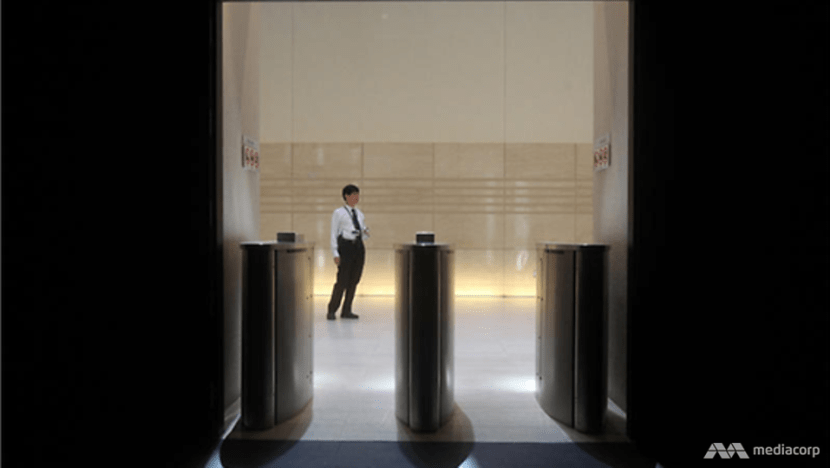Security officers 'well-equipped' to handle abusive situations: Industry associations

File photo of a Singapore security guard.
SINGAPORE: Most security officers are "well-equipped" to handle abusive situations "professionally", as they are required to complete mandatory training in this area, said security associations.
Still, security officers face varying degrees of abusive situations on an almost-daily basis, and individual security agencies can empower their officers by educating them on their rights, they added.
The challenges faced by unarmed security officers were highlighted over the weekend after a resident at Eight Riversuites condominium was seen on camera verbally abusing a guard over a management rule requiring guests to pay S$10 for parking after 11pm.
The man, 44-year-old Ramesh Erramalli, is being investigated for "intentionally causing harassment to a security officer", the Ministry of Home Affairs (MHA) said in a statement late on Wednesday (Oct 30).
"Unfortunately, verbal abuse like what we saw in the video clip is not uncommon," said Union of Security Employees (USE) general secretary Raymond Chin.
"Most security officers are able to handle incidents professionally ... We saw that in the manner the security officers handled the situation that night," he added.
READ: Man in viral video apologises 'many times' to condo security supervisor in private meeting
Mr Raj Joshua Thomas, president of the Security Association Singapore (SAS) said that abusive situations are something officers "face every day" to varying degrees, and that they "very periodically" face someone who is overly aggressive.
"They know that it’s part of their job," said Mr Thomas.
However, the way officers respond to each situation can vary, the industry professionals said.
"Things could get out of hand if residents become physically aggressive," said Mr Robert Wiener, president of Association of Certified Security Agencies (ACSA).
A lot of it too depends on the "temperament and experience" of the security officer, added Mr Thomas.
"They may have the training for it, but ultimately, when you've got tempers in the fray, it's not only a matter of training, right? So it's also a matter of temperament as well. Temperament and experience," he said.
The SAS represents all parties in the security industry, including consultancy companies, training firms and system providers, while ACSA represents security agencies.
READ: Change in security team at Eight Riversuites condo 'unrelated' to Ramesh Erramalli incident
COMPULSORY TRAINING
To become a security officer in Singapore, individuals have to complete two Basic Licensing Units of Singapore Workforce Skills Qualifications (WSQ) courses.
The two units - Handle Security Incidents And Services and Provide Guard and Patrol Services - train individuals to, among other things, handle crime- and fire-related incidents, search and arrest a suspect, and even provide evidence in court, according to the course outline.
Security officers can also opt to take additional courses such as the WSQ Manage Disorderly Conduct And Threatening Behaviour, said Mr Wiener.
"The security sector today is highly regulated. Officers have to fulfil the licensed training units before they can progress in their careers," said Mr Chin.
However, more can be done on the part of the individual security agencies, added Mr Thomas.
"(We) need to empower officers with knowledge of their rights. We need to also empower our officers with the skills as to how to deal with this, and this includes tips like remaining calm, not losing their temper, as well as telling the difficult person that they're only enforcing the rules by referring them to a higher authority," he said.
He added that security agencies could put in standard operating procedures to help their officers understand the best way to respond to such incidents.
The SAS, Mr Thomas added, is looking into laying out a set of optional standard operating procedures that can be adopted by all agencies "somewhere early next year".
This set of procedures, he said, would include advice for security officers when they are in a difficult situation.














